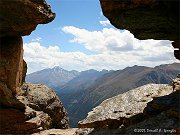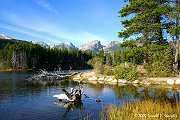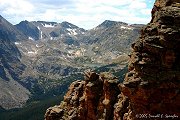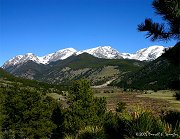
|
Rocky Mountain
National Park - Complete Information Resource
Hiking:
 Rocky
Mountain National Park has 355 miles of hiking trails.
These range from flat lakeside strolls to quite steep
peak climbs. If you are new to the park, rangers at the
visitor centers and backcountry office can provide
advice on trails that are appropriate for different
fitness and experience levels. Rocky
Mountain National Park has 355 miles of hiking trails.
These range from flat lakeside strolls to quite steep
peak climbs. If you are new to the park, rangers at the
visitor centers and backcountry office can provide
advice on trails that are appropriate for different
fitness and experience levels.
 As
you plan your hike, keep in mind that park elevations
range from 7,500 to over 12,000 feet. Even very fit
individuals coming from lower elevations may experience
altitude problems. Symptoms include headaches, shortness
of breath, insomnia, and rapid heartbeat. After a few
days your body will have made some physiological
adjustments to higher elevations, but full As
you plan your hike, keep in mind that park elevations
range from 7,500 to over 12,000 feet. Even very fit
individuals coming from lower elevations may experience
altitude problems. Symptoms include headaches, shortness
of breath, insomnia, and rapid heartbeat. After a few
days your body will have made some physiological
adjustments to higher elevations, but full
acclimation may take a weeks.
 To
minimize symptoms drink plenty of fluids, avoid alcohol,
don't skip meals, and get plenty of rest. Although you
may not feel thirsty, the "thinner" air at
high elevations actually results in increased water
evaporation from your lungs. Again, drinking extra water
may prevent a bad headache or other altitude symptoms. To
minimize symptoms drink plenty of fluids, avoid alcohol,
don't skip meals, and get plenty of rest. Although you
may not feel thirsty, the "thinner" air at
high elevations actually results in increased water
evaporation from your lungs. Again, drinking extra water
may prevent a bad headache or other altitude symptoms.
 Ultraviolet
light is stronger in the mountains because there is less
atmosphere for the sunlight to pass through. Wear
sunscreen, a hat, sun glasses, and consider covering up
with a long sleeved shirt if you are out in the sun for
extended periods. Ultraviolet
light is stronger in the mountains because there is less
atmosphere for the sunlight to pass through. Wear
sunscreen, a hat, sun glasses, and consider covering up
with a long sleeved shirt if you are out in the sun for
extended periods.
 If
you have never hiked before or are traveling with
children, check out the recommended accessible trails.
Ranger-led walks are free and can increase your
confidence while you learn more about the park. Rocky
Mountain National Park is a great place to discover how
traveling by foot brings you closer to nature. If
you have never hiked before or are traveling with
children, check out the recommended accessible trails.
Ranger-led walks are free and can increase your
confidence while you learn more about the park. Rocky
Mountain National Park is a great place to discover how
traveling by foot brings you closer to nature.
Bookmark This Page
|
|